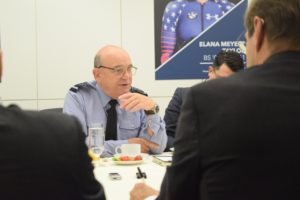A top NATO military official on Tuesday said the alliance’s new operational-level command in Norfolk, Va., is working on several artificial intelligence initiatives, with a goal to begin projects around command and control and logistics support applications.
U.K. Air Chief Marshal Sir Stuart Peach, chairman of the NATO Military Committee, told reporters that alliance officials plan to focus on AI, as well as 5G telecommunications opportunities, in discussions with the private sector at this week’s NATO-Industry Forum in Washington, D.C.

“I think we’re right on the edge now of exciting innovation, on the ability to use artificial intelligence for the right purposes and sustaining our technical lead,” Peach said. “We continue to look for solutions. But I think we’re right on the edge of making this use of artificial intelligence, for peaceful purposes in support of a defensive alliance, a reality.”
Peach said the new Joint Forces Command Norfolk (JFC-NF), which was activated in July, is serving as the central hub for the NATO Military Committee to explore potential AI applications.
“Our command in Norfolk, Virginia, is running a series of workshops on innovation and how we would embrace artificial intelligence,” Peach said. “It’s turning ideas into practicality. That’s what we’re trying to do through the command down in Norfolk.”
JFC-NF’s headquarters are co-located with the recently restored U.S. Navy 2nd Fleet and also led by Vice Adm. Andrew Lewis.
The NATO Military Committee recently held an executive meeting on AI in Belgium, according to Peach, as NATO looks to open up opportunities for industry and academia to bring in emerging technologies concepts.
“It’s really important that this is not just seen as being for the large companies. This is also about working with small and medium enterprises or academic institutions that have got good ideas that we can work with them on,” Peach said.
Peach also noted his committee is looking to further discussion on 5G technology, which follows recent comments from the NATO secretary general calling for all member nations to build out reliable telecom systems that are wholly secure.
“That’s a very active topic of discussion and it has not reached a conclusion. What is true is that you would expect NATO, as a defense and military alliance, to have secure networks and that you would expect us to continue modernizing those networks to make sure they are sufficient in terms of security and ability to operate.”